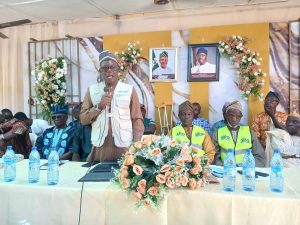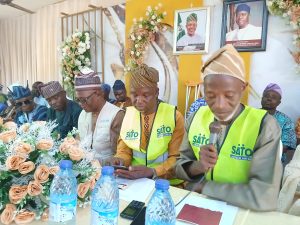In a significant step toward ending Open Defecation (ODF) in Oyo State, the United Nations Children’s Fund (UNICEF) in collaboration with Oyo State Government and local stakeholders, has been working tirelessly to eliminate open defecation through the implementation of the Community-Led Total Sanitation (CLTS) approach.




Speaking during the 2024 Pre-World Toilet Day held at Ona-Ara Local Government Secretariat, Ibadan the Chairman of Oyo State Rural Water Supply and Sanitation Agency, RUWASSA, Hon. Babalola Afobaje, stated that six political wards in the Ona-Ara local government area have been certified Open Defecation-Free (ODF) and two political wards in Egbeda local government area have equally been certified open defecation-free by UNICEF.
Before 2022, only 10 per cent of households in Ona-Ara LGA had access to toilets, and many practised open defecation.
Afobaje said the Oyo State Government has the goal of ending open defecation in the nooks and crannies of the State by 2028 by launching its Roadmap to ODF.
According to him, “on this World Toilet Day, let us reaffirm our commitment to transforming lives through safe sanitation. Together, we can ensure that every person in Oyo State, regardless of their background, has access to a toilet they can use with dignity and safety.”
He said the strategic objective of Oyo State Open Defecation Free (ODF) Roadmap is to eliminate open defecation and ensure equitable sanitation and hygiene (including hand-washing) services for all by 2028 in households, institutions and public places (schools, health facilities, workplaces, markets, motorparks and others) in all urban, small-town, and rural communities of the State.
He said through the successful implementation of Community-led Total Sanitation (CLTS) in the six political wards in Ona-ara LGA, the number of households with toilets increased from 10,422 to 32,658.
Afobaje said to achieve the Roadmap plan, the State partnered with UNICEF, and the Organization adopted three (3) LGAs of the State, namely, Ona-Ara, Egbeda and Ibarapa-East LGA,s, to serve as pilots for Community-Led Total Sanitation (CLTS) approach to ODF communities.
The approach involves triggering and monitoring communities, training SMEs and Masons to become Toilet Business Owners (TBOs) that construct affordable and durable toilets, and introducing a soft loan scheme called Sanitation Revolving Fund (SRF) for households’ toilets construction stated in Ona-Ara and Egbeda since October 2022 while the 3rd LGA, Ibarapa-East was just added this year.
According to Afobaje, the 2 LGAs that started first are at various stages of becoming ODF, saying “Ona-Ara has 6 of its 11 Wards ODF, Egbeda has 2 ODF Wards while the 2 LGAs have lots of ODF communities.”
World Toilet Day is dedicated to highlighting the importance of safe sanitation and advocating for accelerated action to ensure equitable access for all. This year’s celebration is under the meaningful theme, “Toilet: A Place for Peace” which resonates deeply with our mission to promote sanitation and hygiene in our beloved State.
Highlighting the importance of toilets, Afobaje said Toilets provide a private and safe space, especially for women and girls, reducing risks of violence and restoring dignity.
“Safe toilets for all by 2030’ is one of the targets of Sustainable Development Goal 6: 1&2 – but the world is seriously off track, as about 3.5 billion people still live without safely managed sanitation, including 419 million who practice open defecation worldwide. As of 2021, more than 53% of the 9.4 Million projected populations of Oyo State still practice open defecation”, he said.
He applauded UNICEF, Lagos Field Office, for its unwavering technical and funding support and collaboration in advancing our Water, Sanitation, and Hygiene (WASH) programs in the State.
“Together, we are addressing one of the most fundamental human rights: access to clean, safe and dignified toilets by all.”
“Our efforts in the 3 LGAs have yielded positive results, but we all know that there is still much more work to be done.”
Afobaje said through UNICEF’s assistance, the Oyo State government has built the capacities of WASH staff at the State and LGA levels.
He added that the Government had constructed new and rehabilitated many solar and hand-pump boreholes as well as model toilets in schools, and solar and hand-pump boreholes in healthcare centres and vulnerable communities in the 3 pilot LGAs.
His words, “Open defecation is steadily decreasing in the pilot LGAs and we are committed to eradicating it in the State by 2028.
As we gather here today, let us remember that many of our population still lack access to safe, improved sanitation and the impacts are profound—affecting health, education and economic outcomes.
Therefore, the State needs to work five times harder to achieve this goal.”
He urged every stakeholder—government agencies, NGOs, traditional leaders, community members, development partners, private organizations, and individuals to remain united in the cause against open defecation.
UNICEF Water, Sanitation, and Hygiene (WASH) Specialist, Mr Monday Johnson, stated that four years ago Oyo State developed the Open Defecation Road Map which was to guide Oyo State to end ODF, as of today UNICEF has only supported three Local Government: Ona-Ara, Egbeda and Ibarapa East local government in Oyo State to start the process of devices to change the narrative of ODF.
To continue to maintain open defecation-free status, UNICEF, in collaboration with OYORUWASSA, has put in place a revolving loan to help community members construct toilets and for the political wards to maintain their open defecation-free status.
He urged everyone in the LGA to become advocates for ending open defecation and called for a bylaw to be enacted to ensure that in every council in Nigeria, any person who is defecating in the open is sanctioned.
Speaking on the CLTS Achievements, Challenges, and Way Forward, the Director of Environmental Health Services, Sanitarian Popoola Omowumi, stated that toilets are more than just a basic necessity; they’re a place of peace, dignity, and protection.
She maintains that sustainable sanitation systems can save lives by preventing the spread of diseases like cholera, reducing child mortality rates, and promoting economic growth.
According to her, “Before the intervention of CLTS using the Araromi ward as an example, only the Palace of Alararo of Araromi-Aperin had toilet facilities.
However, once the intervention got to Araromi ward, the Kabiesi, swang into action by contacting all bales and baales in the 68 communities of the ward to enjoined all households to construct toilet facilities with locally available materials within their vicinity, with this support made by the king and the teams commitment to ‘One toilet, One household’, Araromi ward became Open Defecation Free (ODF) with 765 households now enjoy improved sanitation facilities.”
She appealed to all of the rural communities leadership of Gbedun, Gbada Efon, to embrace total sanitation by providing toilets in every household in their communities, she concluded.


